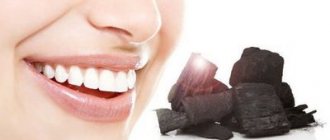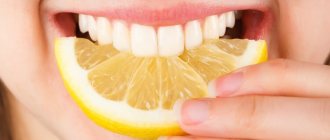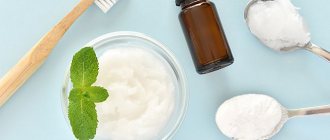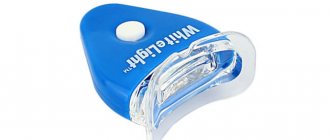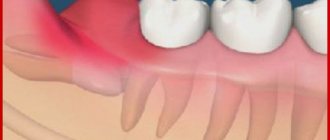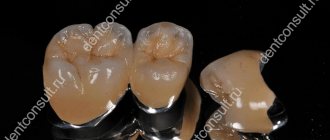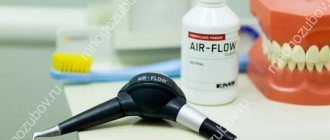Author of the article:
Soldatova Lyudmila Nikolaevna
Candidate of Medical Sciences, Professor of the Department of Clinical Dentistry of the St. Petersburg Medical and Social Institute, Chief Physician of the Alfa-Dent Dental Clinic, St. Petersburg
Acid teeth whitening is still a very popular method of home enamel lightening. But this does not mean that such a procedure is effective or safe. Many people retain the stereotype that natural remedies are not harmful to health and can be used in any dosage and concentration.
In fact, it all ends with increased tooth sensitivity, irritation of the mucous membranes and other troubles.
If you do not want to take risks, it is better to choose professional home or office whitening methods. Of course, these procedures will be much more expensive than a couple of lemons and apples, but think about it, they can turn out to be much cheaper than treating your teeth in case of an unpleasant outcome.
In addition, there is another affordable solution - using specialized whitening pastes. This solves several problems at once: saving you money, maintaining health and whitening.
These products lighten enamel much more effectively than traditional ones. Although they do not allow you to achieve a bright white color, as with professional procedures.
Does lemon water harm our teeth?
Warm water with lemon in the morning is a popular ritual for people leading a healthy lifestyle.
And although this drink has a great effect on our body, unfortunately, it can also harm our teeth. Lemon water awakens the digestive system and strengthens the immune system. Another reason to start the day with a glass of this drink is the fact that lemon belongs to the group of alkaline foods, thanks to which it helps balance the pH of the body.
Helps one and harms another
Unfortunately, lemon water has a negative effect on our teeth. Contact with acidic drinks is not comfortable for the teeth and can weaken tooth enamel. Fruit juices, including water with lemon, destroy the protective cover that is located on the teeth, it protects the enamel from acid erosion.
How to protect tooth enamel without giving up a dose of health?
Fir essential oil
Fir oil copes with diseases such as gingivitis, periodontal disease, and stomatitis. Dental treatment with this oil is carried out by massaging the gums; a bandage is secured on the index finger, a few drops of oil are applied to it and the gums are massaged in a circular motion. At the same time, you should not hope for instant healing of the gums; you must undergo a course of treatment, massage of the gums with fir oil for at least twenty days. You can also apply tampons soaked in oil to the painful tooth, this will help relieve toothache, especially if it prevents you from falling asleep at night.
Sage is also used, it is known for its ability to relieve gum inflammation. For treatment, you will need to make an infusion, preferably in a thermos. To do this, you need to take one part of the plant and pour five parts of boiling water, leave for at least an hour. You can use sage oil to relieve inflammation. Sage helps gums stop bleeding, protects against unpleasant odor when rinsing, and fights stomatitis when taken orally and applied to a cotton swab and used as a lotion.
Despite their tangible benefits, it is not worth choosing essential oils yourself for prevention and treatment. It is better to consult a doctor who will prescribe a specific type of essential oil to use so that it has the maximum benefit on your dental health.
How does citric acid affect teeth?
Citric acid is an organic acid known as the E330 food additive that is involved in metabolism. You can use it to whiten your teeth, but you need to do this very carefully.
The content of the article
- Properties of citric acid
- Citric acid for teeth whitening
Citric acid belongs to the class of carboxylic acids.
It is a white crystalline substance with a sour, non-astringent taste. It has virtually no calories. It dissolves well in water and some organic solvents. It melts at a temperature of 175 degrees, and upon subsequent heating it decomposes into water and carbon dioxide. This acid is actively involved in metabolism and cellular respiration. Thanks to it, skin cells can be renewed. It becomes elastic, firm and beautiful. The complexion becomes pleasant, defects gradually disappear. To do this, you need to make a mask with lemon juice once a week. It can also be added to almost any cream. Citric acid is found in all citrus fruits, pomegranates, pine needles and even shag. In the old days, it was obtained from shag. In modern industry, citric acid is produced by fermenting substances with a high concentration of sugar (for example, molasses). Often special molds are used. Citric acid is known as food additive E330. It is used as an antioxidant. The addition of citric acid improves the taste of many carbonated drinks and the consistency of processed cheese: it spreads much better on bread. Some people use it to whiten their teeth. This is indeed a very effective remedy, but it must be used with caution. The fact is that any whitening process has a detrimental effect on tooth enamel, destroying it and causing caries. These destructions are microscopic, but they affect the health of the teeth, and then the condition of some organs. The dental nerve becomes several times more sensitive. It gets to the point where it becomes painful to chew rough food. If you notice such symptoms, you should immediately contact your dentist.
The procedure can be performed no more than once a week. After this, it is not recommended to eat certain foods (cherries, beets). They can “stain” your teeth. You should also give up coffee and tea.
You can whiten your teeth using hydrogen peroxide and baking soda. However, these substances also destroy tooth enamel. After using them, you should rinse your mouth very thoroughly with warm water. Carry out the procedure no more than once a week to maintain the health of your teeth.
How does citric acid affect teeth?
Medical articles on the Site are provided for reference purposes only and are not considered sufficient advice, diagnosis, or physician-prescribed treatment. The content of the Site is not a substitute for professional medical advice, examination, diagnosis or treatment. The information on the Site is not intended for independent diagnosis, prescription of medications or other treatment. Under any circumstances, the Administration or the authors of these materials are not responsible for any losses incurred by Users as a result of the use of such materials.
How to whiten teeth using folk remedies/at home?
The answer is simple: no way. Don't try to whiten your teeth with your grandmother's advice, you will only harm your teeth.
You should absolutely not use soda, tooth powders, lemon, activated carbon, etc. to whiten your teeth. The only result of such “whitening” will be erosion of tooth enamel.
Remember! Any folk remedies are a waste of time. The worst thing is that some of them can cause great harm to your teeth.
Here are a few ways for those who don't want to spend a lot of money on teeth whitening, but want to have white teeth:
- Visit the solarium a couple of times. Against the background of a dark-skinned body, teeth will appear whiter than usual.
- Get your teeth professionally cleaned every six months. Your teeth will have a healthy, natural color.
- Try not to overuse foods that can darken your teeth: coffee, tea, chocolate, blueberries, Coca-Cola, fruit, wine.
- Do not smoke.
Tea with lemon: effect on teeth
Dentists emphasize that lemon juice is especially harmful in combination with hot water: high water temperature enhances the adverse effects of acid on tooth enamel and thereby contributes to its accelerated destruction.
True, you don’t need to give up your favorite drink altogether. Hot tea with lemon is only harmful if consumed frequently. If you drink it from time to time, and then rinse your mouth with warm water, then unwanted consequences can be avoided.
Important reminder: After drinking lemon tea, wait an hour before brushing your teeth - the acid softens your tooth enamel, and you risk damaging it with your brush.
Come to our dentistry! Our experts will be happy to tell you other interesting facts!
Eight enemies that harm your teeth
A dazzling smile and healthy teeth are long-term investments that need to be invested in throughout your life. This requires discipline and good hygiene skills.
However, your teeth are constantly faced with “enemies” such as food, artificial whitening, drinks and bad habits, which can cause a lot of harm to them in a very short period of time. So, here are the eight main enemies of your teeth.
Tongue piercing
Many people think that tongue piercings are a very cool and fashionable accessory, but have you ever thought about what metal balls constantly present in your mouth can do to your teeth? The oral cavity is not designed for metal objects, and the daily, quite noticeable tapping of your new tongue jewelry on the teeth damages the enamel. This can ultimately lead to chips on the teeth, and what is most unpleasant, on the front, most noticeable ones. In addition, systematic impact loads on teeth (microtraumas) are a common cause of traumatic non-infectious periodontitis, which requires complex multi-stage treatment.
Clinical researches
Clinical studies have proven that regular use of professional toothpaste ASEPTA GENTLE WHITENING for a month allows you to lighten tooth enamel by 1.5 tones, increases anti-caries effectiveness by 3.4 times and increases enamel remineralization by 2.6 times.
Sources:
- Report on determining/confirming the preventive properties of toothpaste “ASEPTA PLUS” GENTLE WHITENING” Author: doctor-researcher A.A. Leontyev, head Department of Preventive Dentistry, Doctor of Medical Sciences, Professor S.B. Ulitovsky First St. Petersburg State Medical University named after. acad. I.P. Pavlova, Department of Preventive Dentistry
- Report on the determination/confirmation of the preventive properties of personal oral hygiene products “ASEPTA PLUS” Remineralization doctor-researcher A.A. Leontyev, head Department of Preventive Dentistry, Doctor of Medical Sciences, Professor S.B. Ulitovsky First St. Petersburg State Medical University named after. acad. I.P. Pavlova, Department of Preventive Dentistry
- Clinical studies of antisensitive toothpaste “Asepta Sensitive” (A.A. Leontyev, O.V. Kalinina, S.B. Ulitovsky) A.A. LEONTIEV, dentist O.V. KALININA, dentist S.B. ULITOVSKY, Doctor of Medical Sciences, Prof. Department of Therapeutic Dentistry, St. Petersburg State Medical University named after. acad. I.P. Pavlova
- Report on determining/confirming the preventive properties of toothpaste “ASEPTA PLUS” COFFEE and TOBACCO Author: doctor-researcher A.A. Leontyev, head Department of Preventive Dentistry, Doctor of Medical Sciences, Professor S.B. Ulitovsky. First St. Petersburg State Medical University named after. acad. I.P. Pavlova, Department of Preventive Dentistry
Does lemon water harm our teeth?
Warm water with lemon in the morning is a popular ritual for people leading a healthy lifestyle. And although this drink has a great effect on our body, unfortunately, it can also harm our teeth.
Lemon water awakens the digestive system and strengthens the immune system. Another reason to start the day with a glass of this drink is the fact that lemon belongs to the group of alkaline foods, thanks to which it helps balance the pH of the body.
Helps one and harms another
Unfortunately, lemon water has a negative effect on our teeth. Contact with acidic drinks is not comfortable for the teeth and can weaken tooth enamel. Fruit juices, including water with lemon, destroy the protective cover that is located on the teeth, it protects the enamel from acid erosion.
How to protect tooth enamel without giving up a dose of health?
How does citric acid affect teeth?
Citric acid is an organic acid known as the E330 food additive that is involved in metabolism. You can use it to whiten your teeth, but you need to do this very carefully.
The content of the article
- Properties of citric acid
- Citric acid for teeth whitening
Citric acid belongs to the class of carboxylic acids. It is a white crystalline substance with a sour, non-astringent taste. It has virtually no calories. It dissolves well in water and some organic solvents. It melts at a temperature of 175 degrees, and upon subsequent heating it decomposes into water and carbon dioxide. This acid is actively involved in metabolism and cellular respiration. Thanks to it, skin cells can be renewed. It becomes elastic, firm and beautiful. The complexion becomes pleasant, defects gradually disappear. To do this, you need to make a mask with lemon juice once a week. It can also be added to almost any cream. Citric acid is found in all citrus fruits, pomegranates, pine needles and even shag. In the old days, it was obtained from shag. In modern industry, citric acid is produced by fermenting substances with a high concentration of sugar (for example, molasses). Special molds are often used. Citric acid is known as food additive E330. It is used as an antioxidant. The addition of citric acid improves the taste of many carbonated drinks and the consistency of processed cheese: it spreads much better on bread.
Tea with lemon: effect on teeth
Dentists emphasize that lemon juice is especially harmful in combination with hot water: high water temperature enhances the adverse effects of acid on tooth enamel and thereby contributes to its accelerated destruction.
True, you don’t need to give up your favorite drink altogether. Hot tea with lemon is only harmful if consumed frequently. If you drink it from time to time, and then rinse your mouth with warm water, then unwanted consequences can be avoided.
Important reminder: After drinking lemon tea, wait an hour before brushing your teeth - the acid softens your tooth enamel, and you risk damaging it with your brush.
Come to our dentistry! Our experts will be happy to tell you other interesting facts!
Eight enemies that harm your teeth
A dazzling smile and healthy teeth are long-term investments that need to be invested in throughout your life. This requires discipline and good hygiene skills.
However, your teeth are constantly faced with “enemies” such as food, artificial whitening, drinks and bad habits, which can cause a lot of harm to them in a very short period of time. So, here are the eight main enemies of your teeth.
Tongue piercing
Many people think that tongue piercings are a very cool and fashionable accessory, but have you ever thought about what metal balls constantly present in your mouth can do to your teeth? The oral cavity is not designed for metal objects, and the daily, quite noticeable tapping of your new tongue jewelry on the teeth damages the enamel. This can ultimately lead to chips on the teeth, and what is most unpleasant, on the front, most noticeable ones. In addition, systematic impact loads on teeth (microtraumas) are a common cause of traumatic non-infectious periodontitis, which requires complex multi-stage treatment.
White wine
Many of us know that red wine can change the color of teeth and leave a yellowish coating on them, but not everyone knows that white wine can also have a bad effect on teeth. Dry white wines are quite acidic and deplete the surface layer of enamel, gradually dissolving it. Darker dentin begins to show through the thinner enamel, which leads to an irreversible change in the color of the teeth. Such darkening of teeth cannot be treated with any whitening; only veneers will help.
Lemon
Although lemon is a rich source of minerals and vitamin C, it is also very high in acid, which can attack tooth enamel. And this, in turn, can lead to problems with increased tooth sensitivity - a painful reaction to hot or too cold food and drinks occurs. Therefore, you should not chew lemons thoroughly, and in general, try to keep them in your mouth as little as possible.
Hello to all tequila lovers!
Chewing pieces of ice
Citric acid destroys the enamel, and pieces of ice can simply chip or crack it. When you chew on ice, the same unpleasant effect occurs as if you grind your teeth vigorously.
Energetic drinks
After a hard sports workout, such drinks can be very refreshing for the body, but do not forget that they are extremely dangerous not only for your cardiovascular system, but also for your teeth. They contain acids that cause tooth decay and promote caries. And glucose, which is included in all energy drinks without exception, is an excellent breeding ground for carious bacteria.
Medicines
Saliva is one of the mouth's biggest protectors, and medications such as those for depression or high blood pressure contain ingredients that dry out the mouth and reduce saliva production. This can lead to oral problems and eventually tooth decay. And probably only the deaf have not heard about the bizarre effect of tetracycline drugs on the color of teeth. As you can see, taking medications harms not only the liver and kidneys, but also the teeth.
Pool water
Swimming in the pool is one of the healthiest sports, because it uses all muscle groups. But there is also a problem: pool water contains many very dangerous chemicals. This mixture of various additives that maintain water quality ultimately causes increased aggressiveness. I don’t think it’s even worth mentioning the increased chlorine content. Thus, while you are enjoying freestyle or breaststroke, the water from the pool is gradually destroying the enamel of your teeth.
VITAMINS AND MINERALS FOR YOUR TEETH HEALTH
The body receives the necessary substances from various foods. It is not always possible to diversify the menu enough to saturate all cells and tissues with valuable elements. The lack of nutrients makes the tooth and gum tissue weaker and worsens the condition of the oral cavity. Vitamins for teeth and gums are an excellent solution for people who want to maintain oral health.
A sufficient supply of valuable microelements and vitamins is the key to the normal functioning of the body. The lack of one or another component quickly affects the density of the gums and the strength of the teeth.
If you don't take timely measures, if your gums bleed, you can get a more serious illness, and bad breath can also indicate some diseases. Such seemingly small problems can even cause tooth loss. Not everyone knows that many dental diseases begin due to a lack of vitamins. In order not to subsequently experience discomfort from toothache, you need to be able to recognize which vitamin is missing, properly care for your oral cavity, eat well and take vitamins for your gums and teeth.
What vitamins are needed and beneficial for healthy teeth and gums:
Vitamin A
Vitamin A is most often associated with good vision, but it is also necessary for maintaining healthy mucous membranes covering the gums and cheeks. This vitamin makes them less susceptible to disease. It keeps tooth enamel healthy. Vitamin A promotes the production of saliva, which plays a very important role in clearing bacteria and food particles from the mouth. This organic compound is found in large quantities, as you, of course, know, in carrots. It is also abundant in other orange-colored vegetables and fruits (for example, mangoes and sweet peppers). A large amount of vitamin A is found in cabbage and spinach. More precisely, these vegetables contain a lot of beta-carotene, which is converted into vitamin A in the human body. And you should also remember about proteins (eggs, fish) - this organic compound is also present there in sufficient quantities.
Symptoms of deficiency:
- The gums begin to become inflamed, swelling and redness appear.
- Prolonged healing of wounds in the mouth.
- The enamel becomes rough.
- Teeth become loose
Vitamin B3
Vitamin B3 (niacin) is involved in many redox reactions in the human body. Its deficiency in the body can lead to mouth ulcers and bad breath. Good sources of this organic compound are fish and chicken. Vitamins B12 and B2 Due to a lack of vitamins B12 and B2 (riboflavin), ulcers may appear on the tongue, gums and soft tissues of the mouth. These vitamins prevent oral inflammation. Their deficiency leads to severe cases of gingivitis, inflammation of the gums without compromising the integrity of the periodontal junction. Vitamin B12 is found in large quantities in spinach, almonds, and whole wheat pasta. And there is a lot of vitamin B2 in meat, fish, dairy products and cheese.
Vitamin C
Vitamin C is needed to maintain healthy gum connective tissue. If there is not enough of it in the body, teeth may become loose and gums may begin to bleed. In general, in this case, the gums are seriously damaged. Did you know that scurvy, an acute gum disease, is caused by a lack of vitamin C? It should also be noted that consuming vitamin C with bioflavonoids prevents the formation of plaque around the teeth. Sources of bioflavonoids: oranges, apricots, cherries, etc. Vitamin C is rich in citrus fruits, strawberries, broccoli, bell peppers and sweet potatoes.
Symptoms of deficiency:
- Bleeding gums.
- Ulcers and wounds on the gums and in the mouth.
- Loose teeth.
- Frequent infectious diseases.
Vitamin D
Vitamin D is very important for oral health as it helps calcium to be absorbed. A lack of calcium often leads to poor dental development, gum disease and caries. Vitamin D deficiency causes burning mouth syndrome. Symptoms of this chronic disease are pain and burning in the mouth, numbness, dry mouth, and changes in taste. According to some reports, this syndrome may also be caused by a lack of vitamin B. Good sources of vitamin D: eggs, fish, milk and cod liver. You can get the entire daily requirement of this vitamin by being in the sun for 15 minutes.
Symptoms of deficiency:
- Dry mouth.
- Metallic taste.
- Caries, tooth decay
Vitamin E
Vitamin E is a very powerful antioxidant. It is useful for restoring oral tissues. It also reduces gum soreness in young children when they are teething. Vitamin E is found in sunflower seeds, nuts, leafy green vegetables, fish, avocados, and peanut butter. Calcium A sufficient amount of calcium in the human body keeps his teeth in good condition. Regular consumption of this mineral protects tooth enamel. If the body does not have enough calcium, it automatically takes it from the bones, which leads to their softening. Calcium is quickly absorbed into the blood, so it needs to be consumed in large quantities. Calcium also protects against osteoporosis, a disease that causes decreased bone density, including around the teeth. Calcium is present in dairy products, green leafy vegetables, cauliflower, legumes, soy milk, almonds, sardines, salmon, oysters.
Symptoms of deficiency:
- Dry mouth.
- Ulcers in the mouth.
- Increased tooth sensitivity
Phosphorus
Phosphorus, like calcium, is an integral part of teeth. According to scientific research, in order for calcium to be well absorbed into the body, it must be consumed together with phosphorus, which is abundant in milk, cheese, yogurt, red meat, beans, lentils, nuts and whole grains. Iron Due to insufficient iron in the body, the tongue may become inflamed and ulcers may appear in the mouth. The fact is that iron helps maintain red blood cells at the required level, thanks to which the immune system effectively fights diseases and infections. Good sources of iron: eggs, seafood, red meat, liver, bran, green leafy vegetables.
Symptoms of deficiency:
- Pain in joints and bones.
- Frequent bone fractures.
- Development of anemia.
- Subcutaneous hemorrhages.
- Periodontal disease
Potassium
Potassium is indispensable in the formation and restoration of bones, including, of course, jaw bones. It protects against osteoporosis and participates in the regulation of redox processes in the body. Potassium is necessary for blood clotting (small wounds in the mouth heal faster). There is a lot of potassium in legumes, leafy green vegetables, milk, yogurt, cheese, mushrooms, bananas, rose hips, and green tea. Fluoride In dentistry, fluoride is used to counteract the breakdown of tooth enamel. Please note that fluoride is often an ingredient in toothpastes. It is used precisely to protect tooth enamel and fight caries. Fluoride can be found not only in toothpaste, but also in some foods. For example, there is a lot of it in black tea and seafood.
Symptoms of deficiency:
- Nose and gastrointestinal bleeding.
- Bleeding gums.
- Subcutaneous hemorrhages
Iodine The trace element iodine is involved in almost all vital processes of the body. It promotes the absorption of calcium, and thus helps teeth grow and maintains them in good condition. Iodine is necessary for the proper functioning of the thyroid gland. If the functioning of the thyroid gland malfunctions, this leads to problems with metabolism. Iodine is found in seaweed, shellfish, sesame, and garlic.
Zinc
The trace element zinc, if sufficient in the body, controls the level of bacteria in the mouth. And these bacteria, naturally, if there are too many of them, destroy teeth and gum tissue. So zinc has to be closely monitored so that bacteria do not multiply too much in the mouth. Zinc is found in large quantities in red meat, cheese, oysters, legumes, mushrooms, pumpkin seeds and dark chocolate.
Magnesium The trace element magnesium protects tooth enamel from thinning and destruction and strengthens it. This trace element is found in cabbage, spinach, and dark chocolate.
Folic acid
With a lack of folic acid (vitamin B9) in the mouth, problems arise with the mucous membrane, tongue, and ulcers appear (aphthous stomatitis). Overall, this is a very important vitamin for oral health. It is found in spinach and lettuce leaves, parsley, cabbage, onions, potatoes, meat, liver, and kidneys.
Doctors and nutritionists say that the more varied a person’s diet, the lower the risk of developing a lack of nutrients.
To strengthen teeth and gums, it is necessary not only to eat well, but also to take into account that some vitamins and minerals cannot be absorbed normally without following certain rules. For example, calcium cannot be absorbed without vitamin D. Therefore, no matter how much fish you eat, if the body does not have enough vitamin D, then calcium will not be absorbed from it. Vitamin A is fully absorbed only in the company of vitamin E. Therefore, carrots are recommended to be consumed together with vegetable oil.
All kinds of oral care products are also sources of vitamins and minerals.
Dentist-therapist of the highest category
Rudkovskaya Elena Vatslavovna
Benefits and harms
The citrus in question contains many useful components:
- potassium and copper salts; carotene; Apple acid; essential oils; lemon acid.
By contacting with lemon, the enamel is cleansed of age spots. In addition, the product improves metabolic processes in soft tissues and has an anti-inflammatory and antibacterial effect.
It is important to understand that exposure to such bleach can cause harm. Contact with abrasives or acids is considered corrosive. After teeth whitening at home with lemon, the crystalline bond of the enamel is broken. Calcium is washed out of it. Therefore, it is important not to overdo it in this matter.
Ways to whiten teeth with lemon
To ensure that teeth whitening with lemon does not harm your health, experts recommend preparation. When planning the procedure, increase your body's intake of calcium, phosphorus and proteins (dairy products, river fish, seafood). Supplement your diet with a vitamin complex for teeth.
One-ingredient recipes
Teeth whitening can be done with lemon juice or zest. Using oil also has a brightening effect. At the same time, it has a less aggressive effect:
- Rub citrus zest onto the surface of your teeth for a few minutes. Then, without closing your jaws, wait 5 minutes and rinse your mouth with water. The procedure can be performed daily for 7–10 days. Apply a slice of fresh lemon to your teeth. After 5 minutes, rinse your mouth with water. After 7–10 days, you can notice a lightening of the enamel shade by several tones. Whitening with lemon juice additionally has an antibacterial effect on the entire oral cavity. To do this, dilute the product with boiled water (1:1). Rinse your mouth with the product for 5 minutes. Do not perform procedures for more than 14 days.
Recipes for teeth whitening with lemon at home
Lemon for teeth whitening can be used not only in its pure form, but also as an additional additive:
- Toothpaste with the addition of citrus juice will speed up the lightening process. However, the method is considered more aggressive. It is necessary to clean by adding an equal amount of juice to the paste. Read more about toothpastes → Teeth whitening with citric acid with the addition of baking soda. These two components are mixed in equal proportions and a little water is added to obtain a porridge-like consistency. Carefully brush the surface of the units with a toothbrush for several minutes. After this, you need to let the composition “work” a little, sitting with your mouth open. Then rinse the acid and soda thoroughly. After a week's course, take a break (20–40 days). The use of lemon oil has a gentle effect. In addition, the procedure assumes a therapeutic effect (anti-inflammatory, strengthening, preventive). The product must be mixed with tea tree oil. After regular brushing, dip the brush into the mixture and massage your teeth and gums thoroughly. Suitable for daily use.
Beneficial properties of essential oils
When used carefully, essential oils can be quite beneficial. Today they are widely used in medicine, cooking and, of course, in perfumery.
Essential oils are also used to disinfect the oral cavity and whiten teeth. They are safer than various abrasives (soda, chalk), but they still need to be used very carefully, while at the same time carefully monitoring the body’s reaction. The most popular oils for whitening are coconut, lemon, sunflower and fir oil. Let's talk in more detail about the features of their use.
Coconut oil
Coconut oil has good bactericidal properties and can improve the color of enamel. Whitening with its help has become popular relatively recently, but today the Internet can offer you many ways to use it. The most famous techniques:
- Rinse your mouth with coconut oil as soon as you wake up. The procedure will take you 10-15 minutes. After this, brush your tongue and teeth with regular toothpaste. At night, rinse your teeth with oil after brushing your teeth. Spit out the rest and do not rinse.
- For oral diseases, it is recommended to rinse your teeth with coconut oil after every meal.
- For a whitening effect, you can add turmeric to the oil.
Lemon oil
Due to its properties, lemon oil whitens enamel quite effectively. Therefore, it is often used in the production of tooth powders and pastes. But when whitening with pure oil, you should be very careful, as it can cause real harm to the teeth and increase the sensitivity of the enamel.
Directions for use:
- Apply the paste to your toothbrush and then add 2-3 drops of oil on top.
- Mix lemon oil with tea tree oil and also add to toothpaste.
- Brush your teeth as usual, then place some oil on a clean toothbrush and brush again. Rinse your teeth with water.
The effect of the procedures will become noticeable in about two weeks.
Fir oil
Fir oil has a viscous consistency, it is transparent or has a slight greenish tint. Since ancient times, it has been used to treat diseases of the liver and respiratory system; in addition, the substance has a positive effect on the immune system, effectively increasing the body’s resistance to various infections.
The use of fir oil for whitening was invented quite recently, but the method quickly became popular. The disinfectant properties of the oil help improve the condition of the oral cavity. Fir prevents the growth of bacteria, resulting in less yellow plaque accumulating on the teeth. But remember, you shouldn’t overdo it here either, otherwise you may get allergies and other unpleasant consequences.
Sunflower oil
Sunflower oil is widely used in the east to improve health and treat a variety of diseases. Rinsing your teeth with sunflower oil helps remove toxins and waste, and also gets rid of harmful bacteria.
The method of application is very simple: take a teaspoon of oil and rinse your mouth thoroughly with it, making chewing movements so that the substance gets on all the teeth. Next, rinse your mouth thoroughly with boiled water.
The effect of oil pulling is quite questionable and you will need to do the procedure for a long time to see any results. People who have stomach problems should use the substance with greater caution.
The effectiveness of oils for teeth whitening
Oils, of course, have some effect on the teeth and oral cavity, but in general their effectiveness is questionable. At best, they will help get rid of unpleasant odor and inflammation and, perhaps, slightly affect the color of the enamel.
But if your dream is to get a snow-white smile, you should turn to professionals. This, of course, will be more expensive, but you will get visible results in a short time. Plus, the dentist will choose the most suitable course for you, taking into account the condition of the teeth and the entire body as a whole. Today, there are many in-office and home procedures that allow you to achieve radiant whiteness without damaging the enamel. Among them there will definitely be one that suits you.
Precautionary measures
We must not forget that teeth whitening at home, as in a dental clinic, has an aggressive effect on the enamel and gums. Therefore, follow the recommendations of a specialist:
- do not increase the exposure time and the number of procedures per day; courses should not exceed more than 2 weeks; the lightening process requires preliminary and subsequent mineralization of the enamel; do not self-medicate aesthetic problems if you have diseases of the teeth and gums; if sensitivity increases (reaction to temperature changes, sweet, sour, spicy), you need to stop bleaching the enamel with lemon.
In pursuit of beauty, it is important not to harm your health with your actions.
Healthy foods for the kidneys
For kidney disease, diet No. 7 is prescribed. It helps limit the intake of substances that irritate the kidneys and also has an anti-inflammatory effect. Kidney-healthy foods are low in protein, have a diuretic effect, and help control weight.
Cabbage
Cabbage contains 92% water, high fiber, low calories and carbohydrates. It is rich in vitamins A, C, E and B and minerals. Also contains folic acid and arginine, which helps fight colds.
It is considered a natural antibiotic, as it contains substances that can reduce the level of infectious microorganisms.
It is also beneficial for good mental functioning, thyroid function, fat burning, preventing hypertension and lowering cholesterol levels.
It is better to eat it raw so that it does not lose the properties of its water-soluble vitamins.
Red paprika
Paprika contains a fair amount of calories, plenty of water and fiber.
